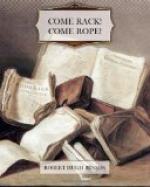When he was gone at last she went back again to the parlour, and sat without moving and without seeing. She was in an agony lest she had been unmaidenly in determining to go so soon as she heard that Robin was to be there.
CHAPTER II
I
Anthony lifted his whip and pointed.
“London,” he said.
Marjorie nodded; she was too tired to speak.
* * * * *
The journey had taken them some ten days, by easy stages; each night they had slept at an inn, except once, when they stayed with friends of the Babingtons and had heard mass. They had had the small and usual adventures: a horse had fallen lame; a baggage-horse had bolted; they had passed two or three hunting-parties; they had been stared at in villages and saluted, and stared at and not saluted. Rain had fallen; the clouds had cleared again; and the clouds had gathered once more and rain had again fallen. The sun, morning by morning, had stood on the left, and evening by evening gone down again on the right.
They were a small party for so long a journey—the three with four servants—two men and two maids: the men had ridden armed, as the custom was; one rode in front, then came the two ladies with Anthony; then the two maids, and behind them the second man. In towns and villages they closed up together lest they should be separated, and then spread out once more as the long, straight track lengthened before them. Anthony and the two men-servants carried each a case of dags or pistols at the saddle-bow, for fear of highwaymen. But none had troubled them.
A strange dreamlike mood had come down on Marjorie. At times it seemed to her in her fatigue as if she had done nothing all her life but ride; at times, as she sat rocking, she was living still at home, sitting in the parlour, watching her mother; the illusion was so clear and continuous that its departure, when her horse stumbled or a companion spoke, was as an awaking from a dream. At other times she looked about her; talked; asked questions.
She found Mistress Alice Babington a pleasant friend, some ten years older than herself, who knew London well, and had plenty to tell her. She was a fair woman, well built and active; very fond of her brother, whom she treated almost as a mother treats a son; but she seemed not to be in his confidence, and even not to wish to be; she thought more of his comfort than of his ideals. She was a Catholic, of course, but of the quiet, assured kind, and seemed unable to believe that anyone could seriously be anything else; she seemed completely confident that the present distress was a passing one, and that when politics had run their course, it would presently disappear. Marjorie found her as comfortable as a pillow, when she was low enough to rest on her....
* * * * *




